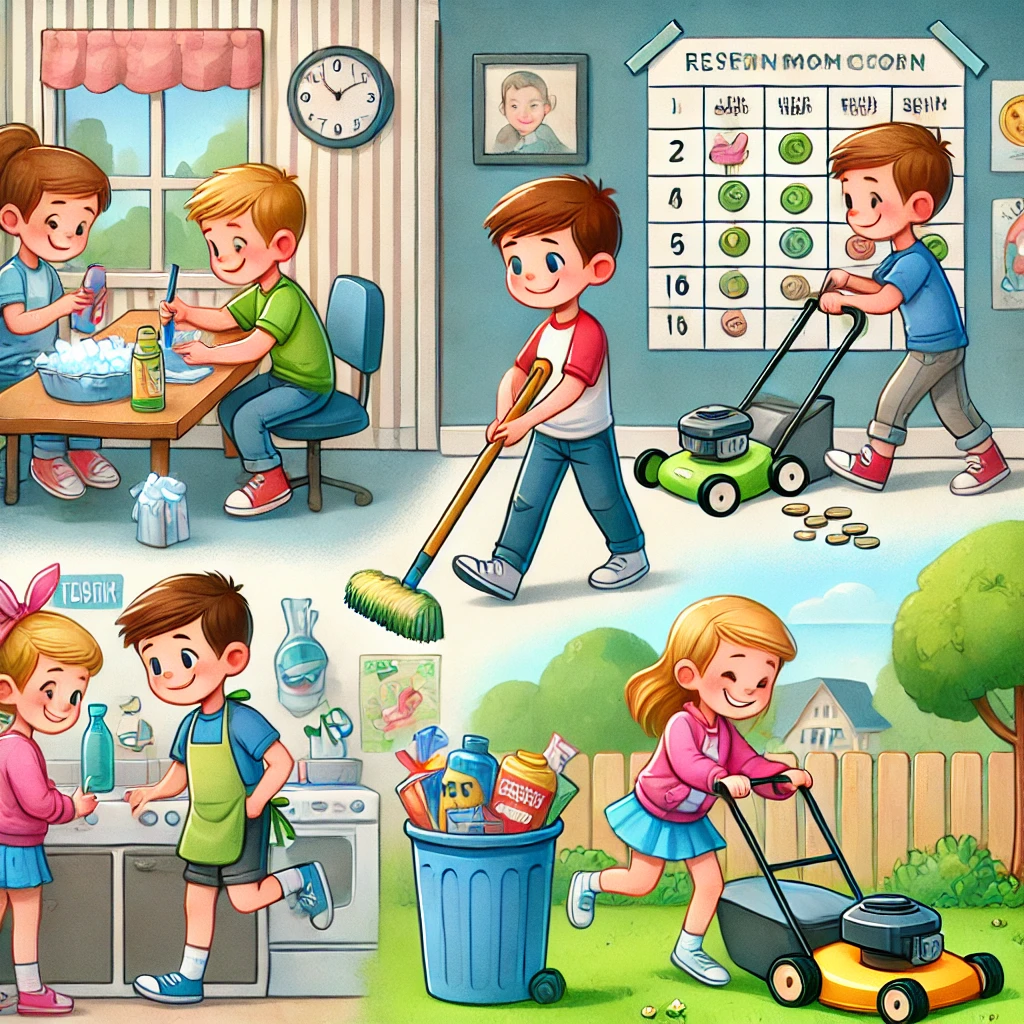Educating children almost duty and the esteem of difficult work is a vital angle of child rearing. One of the best ways to do this is by allotting chores for kids to earn money. Not as it were do chores offer assistance construct fundamental life aptitudes, but they moreover grant kids an opportunity to learn almost money related freedom at an early age. By allotting age-appropriate chores, guardians can energize their children to create a work ethic whereas moreover giving them with a way to gain take cash. This article will investigate different chores reasonable for children, how much to pay, and the benefits of presenting money-earning chores at a youthful age.
The Importance of Chores for Kids
Assigning chores to children offers a number of imperative benefits that go past fair getting things done around the house. A few of these key benefits include:
- Teaching Responsibility: Completing chores for cash makes a difference kids get it that exertion is required to gain a remunerate, ingrains a sense of teach and commitment.
- Building Work Ethic: Winning cash from chores presents kids to earn money of budgeting, sparing, and investing wisely.
- Financial Literacy: Numerous of the chores kids perform are foundational life aptitudes, such as cleaning, organizing, and taking care of pets.
- Developing Life Skills: Numerous of the chores kids perform are foundational life aptitudes, such as cleaning, organizing, and taking care of pets.
By setting up a structure for kids to earn money through chores, guardians can offer assistance children construct basic abilities for their future victory, both by and by and professionally.
Age-Appropriate Chores for Kids
It’s important to assign chores that are suitable for your child’s age and abilities. Here are a few cases of age-appropriate chores that kids can perform to gain money:
Chores for Ages 4-6
At this youthful age, children can begin learning the essentials of cleaning and organizing. Chores ought to be basic and directed to guarantee security. Here are a few thoughts for more youthful kids:
- Picking up toys: Kids can offer assistance clean up their play zones by putting toys back in their assigned places.
- Making the bed: In spite of the fact that it may not be idealize, children can start learning how to rectify their bed each morning.
- Watering plants: With a small direction, kids can water indoor or open air plants.
- Feeding pets: Allot basic pet care errands such as refilling nourishment or water bowls.
- Sorting laundry: Children can offer assistance sort dress by color or sort some time recently washing.
Chores for Ages 7-9
As children develop, they can handle more complex chores and take on extra obligations. At this organize, they ought to be able to work more freely on assignments such as:
- Sweeping floors: Using a broom to clean hard floors is a great chore for this age group.
- Taking out the trash: Kids can be responsible for emptying small trash bins and taking garbage to the curb.
- Folding laundry: Teach kids how to fold simple items like towels, T-shirts, and pants.
- Setting the table: Children can assist in setting the table before meals, including plates, utensils, and napkins.
- Clearing the table: After meals, kids can help clear dishes and wipe down the dining area.
Chores for Ages 10-12
Older children can take on more progressed chores that require more noteworthy consideration to detail and duty. These errands are frequently more physically requesting but are well inside the capabilities of pre-teens:
- Vacuuming: Kids can be responsible for vacuuming carpets or rugs in common areas and bedrooms.
- Cleaning windows: Teach children how to clean windows with glass cleaner and a cloth.
- Mowing the lawn: With supervision, older kids can help mow the lawn or trim bushes in the yard.
- Washing dishes: Children can hand-wash dishes or load/unload the dishwasher.
- Organizing their room: Encourage kids to clean and organize their rooms, putting clothes away and tidying up toys and personal items.
Chores for Ages 13 and Up
By their young a long time, kids can handle more complex family assignments and may indeed be prepared for odd occupations that amplify past the domestic. Here are a few chore thoughts for teens:
- Babysitting younger siblings: Older kids can be responsible for watching younger siblings for short periods.
- Washing the car: Teens can help wash the family car and vacuum the interior.
- Cooking simple meals: With proper guidance, teens can prepare simple meals for the family.
- Grocery shopping: Older kids can assist with grocery shopping by checking off items from the list or helping carry bags.
- Yard work: Teens can handle yard maintenance, including raking leaves, trimming hedges, or planting flowers.
How Much to Pay Kids for Chores
Determining how much to pay your children for chores can be a bit dubious, but there are a few rules to consider. The sum you pay ought to be based on components such as:
- Age and Ability: More youthful children ought to be paid less for less difficult errands, whereas more seasoned kids who handle more complex chores can be paid more.
- Frequency of the Chore: Every day chores may warrant a littler installment, whereas week after week or month to month assignments seem come with a higher reward.
- Effort Required: The more exertion and time a chore requires, the higher the recompense ought to be.
Here’s a fundamental case of a pay structure for diverse age groups:
- Ages 4-6: $1-2 per simple task (e.g., picking up toys, feeding pets)
- Ages 7-9: $2-4 per chore (e.g., vacuuming, setting the table)
- Ages 10-12: $4-6 per chore (e.g., mowing the lawn, cleaning windows)
- Ages 13 and up: $6-10 per advanced task (e.g., washing the car, cooking meals)
Additionally, guardians can offer rewards for chores that are done uncommonly well or completed ahead of plan. This can spur children to take pride in their work and reliably perform at a tall level.
The Benefits of Kids Earning Money from Chores
Permitting children to win cash from chores has a few benefits, especially when it comes to instructing budgetary obligation and planning them for grown-up life. Here are a few of the key advantages:
1. Teaches Financial Literacy
When kids gain cash through chores, they begin learning approximately the esteem of a dollar. This makes a difference them get it sparing, investing, and indeed budgeting at a youthful age. Guardians can energize kids to earn money of their profit for bigger buys, cultivating a sense of postponed gratification.
2. Instills Work Ethic
Kids who perform chores for cash rapidly learn that rewards come from exertion. This ingrains a strong work ethic, educating children that steady, quality work leads to positive results. Over time, this work ethic will expand into other zones of their lives, such as school and future jobs.
3. Provides Motivation
For numerous kids, cash is a effective inspiration. When children are remunerated for completing chores, they are more likely to remain locked in and eager almost their duties. This can too educate them to oversee their time successfully so that they can total assignments in a convenient manner.
4. Builds Independence
As children take on more chores and gain their possess cash, they start to encounter a more prominent sense of autonomy. They can make their claim choices approximately how to spend or spare their profit, making a difference them create certainty in their claim judgment.
Conclusion
Assigning chores for kids to earn money is an great way to educate duty, construct a solid work ethic, and present money related education at an early age. By giving age-appropriate assignments and reasonable remuneration, guardians can offer assistance their children learn profitable life aptitudes whereas cultivating a sense of freedom and achievement. As kids develop, they can take on more challenging chores, planning them for the obligations they’ll confront as grown-ups.










